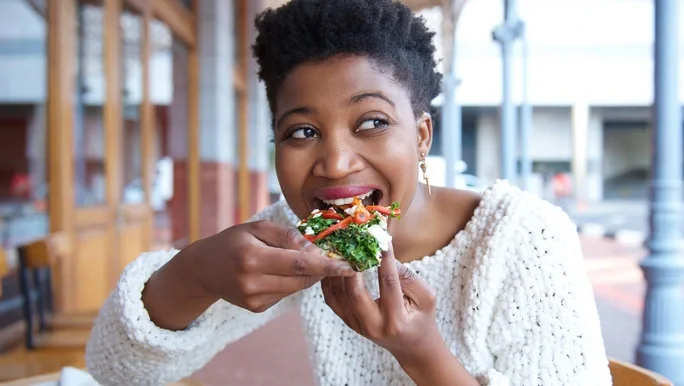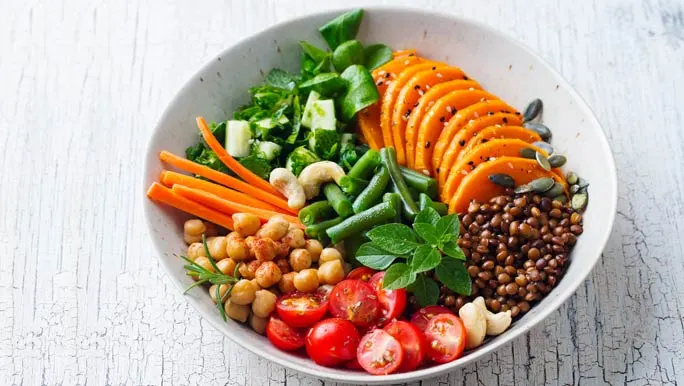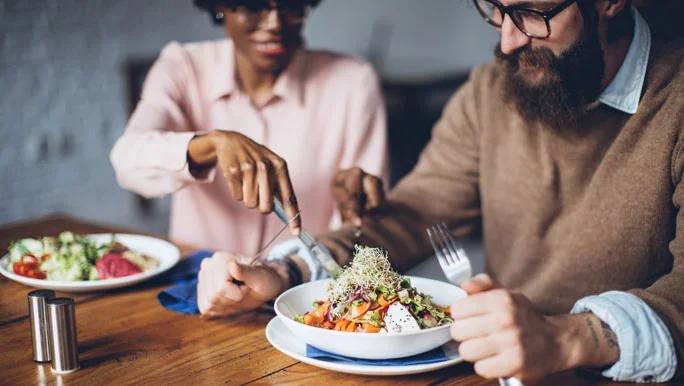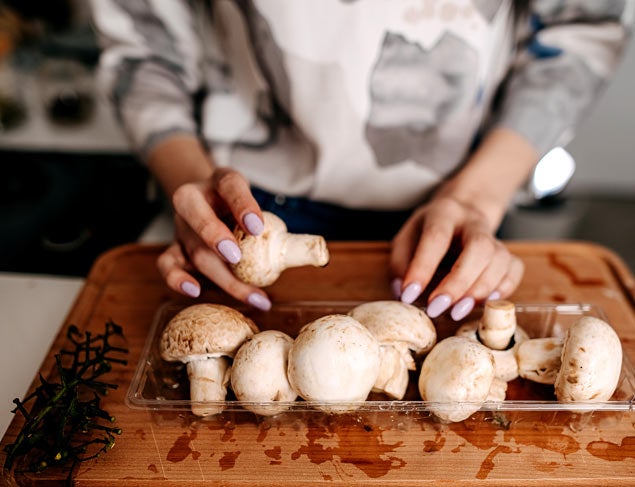Is going vegetarian a healthier eating option?

Vegetables are good for you, so a vegetarian diet could potentially be the best dietary choice, right? If only it were that simple.
Dietitian and healthylife Chief Health Officer, Simone Austin cautions against making broad generalisations and statements about the healthiness of one type of diet over all others.
Key points
- Any dietary choice isn’t automatically healthy – it depends on what food you’re eating.
- To potentially benefit from being vegetarian, you may need to eat a balanced diet.
- It’s possible to get enough iron as a vegetarian depending on your food choices.
- Rather than comparing your dietary choices to anyone else, find your own balance.
“If you look at the Mediterranean diet or traditional Japanese diets, they have small amounts of animal products, and they're still considered to be very healthy as well,” Simone explains.
Simone also notes that everyone is different, so what might work for one person may not work for another. And that’s OK.
With that in mind, let’s look at the potential health benefits.
A dietary choice is only as healthy as you make it
According to Simone, just because you follow a vegetarian diet doesn’t mean you’re healthier than those who don’t.
“Without a variety of fresh fruits, in-season vegetables, high protein vegetarian foods and other important nutrients, your diet isn’t necessarily going to be any healthier than one that includes meat,” she says.
“Deep-fried chips or white pasta with sauce are vegetarian foods. But alone, they aren’t going to give you all the nutrients you need.”
It’s more than just how many servings of vegetables per day you eat. Whether you eat a vegetarian diet, a vegan diet or whatever other diet you choose, it’s only as healthy as the food you put on your plate.
According to the Australian Guide to Healthy Eating, we should aim to eat a wide variety of nutritious foods each day. The challenge is understanding what a well-balanced plate looks like and striving to achieve that with your meals.

Overall, Simone reiterates that to get the potential benefits of being vegetarian, you need to eat a balanced diet.
Is it more healthy to be a vegetarian?
While sweeping generalisations about the health of the vegetarian diet aren’t very useful, it’s good to understand the benefits of a balanced vegetarian diet.
“Balanced is the keyword here,” says Simone, “Research has shown that a majority plant-based diet could have health benefits. Obviously, following a vegetarian meal plan may open you up to this plant-based style of eating.”
As Simone explains, if you’re eating lots of plant foods, you may be getting lots of antioxidants and fibre. And fibre is really important for your bowels and your gut. Good gut health is linked to our mood, immune system, and general health.
Legumes and lentils are great sources of iron for vegetarians. As are green leafy vegetables such as spinach.
One question people often ask is if a vegetarian diet could reduce inflammation. Simone notes that the answer probably isn’t what people want to hear as there doesn’t appear to be a direct causal link.
However, she suggests that eating a plant-based diet may reduce your risk of long-term diseases such as diabetes or heart disease, which could be associated with chronic inflammation.
Overall, Simone reiterates that to get the potential benefits of being vegetarian, you need to eat a balanced diet of fruit, veggies, grains, legumes, nuts, seeds, eggs and dairy.

Eating your lentils or legumes with food that contains vitamin C could help to increase the absorption of the iron.
Getting enough iron as a vegetarian
How do vegetarians get iron? Simone says that while many vegetarians worry about getting enough iron, it’s possible with the right food choices.
“Legumes and lentils are great sources of iron for vegetarians. As are green leafy vegetables such as spinach,’ she says.
Simone explains that many people don’t realise that the iron found in plant-based food is non-heme iron. She says that for your body to absorb this non-heme iron, it needs to be converted into heme-iron. You may need to combine your plant-based iron-rich foods with a food that contains vitamin C for this process to happen.
“Eating your lentils or legumes with some capsicum, tomatoes or a piece of fresh fruit could help to increase the absorption of the iron,” advises Simone.
Teenagers and vegetarianism
As a parent, you may spend your life wondering how to encourage your child to eat vegetables. You may try every trick and tip in the book to get them to eat just one more pea or to try a taste of carrot.
And then when they’re teenagers, they suddenly decide they’re vegetarian. Wonderful. Brilliant. Maybe all your hard work battling a toddler at the dinner table actually paid off.
Instead, now your worry about eating enough vegetables may be replaced with concerns about how to help them be a healthy vegetarian teenager.
Simone wants to assure you that anyone may follow a vegetarian diet – providing they consider their total nutritional requirements. It’s also good to consult a health professional first, particularly if you have any medical conditions as we all have different nutrition needs.
“It’s important that teens have enough total energy in their diet. They’re growing, so energy and protein are really important. If they aren’t eating some of the higher protein foods like meat that are a bit more energy-dense, they may need to replace that with vegetarian protein options such as legumes, dairy or eggs,” Simone explains.
Simone also notes that if teenagers are vegan, rather than vegetarian, they will need to eat more protein-rich foods such as lentils or nuts and seeds.
“Calcium is another important nutrient for this age group. Calcium is found in dairy products, or soy in the case of vegans,” she says.

One of the benefits of following a flexitarian diet is it gives you the flexibility to eat what your body needs.
The popularity of flexitarianism
Simone has already touched on the benefits of plant-based eating. The plant-based and vegan difference often comes down to environmental vs health concerns. This is perhaps why the flexitarian diet is becoming increasingly popular.
What is a flexitarian? It’s basically someone who follows a predominantly plant-based diet that includes some animal products and meat.
Simone says that one of the benefits of following a flexitarian diet is it gives you the flexibility to eat what your body needs. But also, to eat what you love.
“If you’re low in iron or craving a piece of red meat, a flexitarian diet means you may have that meat. You may get the benefits of eating a mainly plant-based diet while also being able to eat what you want and need,” explains Simone.
The important message from Simone is that you shouldn’t feel like you need to label your diet. Even when the world’s most well-known animal lover, David Attenborough, was asked if he is a vegan, he didn’t jump to a label. (For those who are curious, no he isn’t a vegan!)
If you could get the balance from a vegetarian diet, that’s great. If you could get that same balance from a vegan diet, wonderful. If you need to eat some meat every now and then to maintain your balance, Simone says you should do what works for you.
Comparison is the thief of joy
Food is amazing. Not only does it nourish your body, but it also tastes wonderful. That’s the beauty of it – biting into a delicious meal that you know is packed with goodness to make your body tick.
Rather than comparing your dietary choices to anyone else, it’s OK to find your balance. Vegetarian, vegan, flexitarian or whatever you want to call it. Eat well and enjoy it.
And, if you have any concerns about dietary choices, be sure to speak to your health professional.
A simple tool to provide insight into your shopping habits and inspiration to make healthier choices
Check out healthylife Food Tracker - a simple tool to help inspire you to make healthier food choices and achieve a more balanced diet.
Related:
- How to create a meal plan and stick to it
- What is organic food and is it really better for us?
- healthylife Food Tracker
Simone Austin is an accredited Practising Dietitian, an Advanced Sports Dietitian and President of Sports Dietitians Australia. Her passion for optimising sports performance and health through nutrition has led Simone through her 25+ year career working with some of Australia’s top sports teams.
Reviewed by the healthylife Advisory Board September 2021
